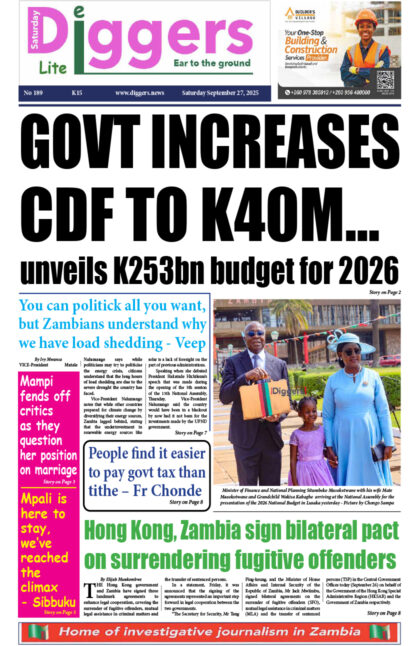Minister of Finance Dr Bwalya Ng’andu says Africa is at a crossroads due to increasing debt levels and debt servicing that has impacted adversely on developmental investments and social sector provisions.
And Dr Ng’andu says there is need for policies and building of institutions that will address debt vulnerabilities, reduce fiscal deficits, address the infrastructure deficit and bring back growth for employment creation and poverty reduction.
Speaking at the 35th Annual General Meeting of the Board of Governors of the Eastern and Southern African Trade and Development Bank (TDB) held in Livingstone, Thursday, Dr Ng’andu noted that increasing debt levels could be attributed to the reduced or complete withdrawal of traditional partners’ support on the back of debt relief under the HIPC initiative.
“Our continent is at the crossroads. Following a decade of growth, our economies have slowed down! This weigh-down has largely been a direct result of the scarcity of development financing as most traditional partners that provided cheaper and long-term financing for development either pulled out of the continent or reduced their support at the back of debt relief that had been provided earlier under the HIPC initiative. This resulted in most of our countries turning to commercial and non-concessional financing that has now led to a multiplicity of challenges key among them are: The reduction in fiscal buffers as seen in large fiscal deficits on the continent; increasing debt levels and debt service that have impacted adversely on developmental investments and social sector provisions; reduction in reserves that has eroded external buffers leading to exchange rate volatilities; and failure by the continent to invest in climate adaptation through the lack of investments in infrastructure, such as energy and agriculture with far-reaching negative consequences on employment creation and poverty reduction,” Dr Ng’andu said.
And he said that there was need for policies and building of institutions that will address debt vulnerabilities, reduce fiscal deficits, address the infrastructure deficit and bring back growth for employment creation and poverty reduction.
“Coming out of this difficult situation, therefore, will require effective leadership, which is anchored on home-grown solutions. Reliance on external benefactors is long gone. They can only assist where our solutions have been clearly defined and strong implementation mechanisms put in place. This involves the setting up of financing solutions that can increasingly answer to these challenges. We urgently need policies and build institutions that will address debt vulnerabilities, reduce fiscal deficits, address the infrastructure deficit and bring back growth for employment creation and poverty reduction. We can do it and we have to do it,” he said.
He has called on the TDB to support private sector initiatives aimed at boosting intra-regional trade.
“In the area of trade, I note that, while there is some progress, intra-regional trade has remained low. TDB should start positioning itself to play a critical role in enhancing intra-regional trade, which is central to our desired integration. I, therefore, urge the Bank to support private sector initiatives aimed at boosting intra-regional trade, including sharing of information on investment and market opportunities through private sector platforms. I am confident that the Bank’s management team will respond to this call,” he said.
“With the reality of climate change, energy sector development has become more urgent than ever. The impact on this sector is bound to be one of the largest constraining factors for future economic prospects on the continent. With the Bank’s ability to marshal in other credible financiers in the world, I urge the Bank to take the opportunity to explore this sector that has potential to grow the continent and bring deeper value to the balance sheet of the Bank. For example, I am aware that the Bank has played an essential role in resolving energy challenges in Zambia. TDB extended a US $20 million credit facility to Ndola Energy Company Limited to finance part of the construction and operation of a 50-megawatt power plant. The plant has since expanded and currently generates 105 megawatts, which is fed into the national grid. This project has contributed to mitigating electricity shortages in the country and, thereby, contributing to economic growth, job creation and development in Zambia. This can be replicated in the rest of the continent.”
He, however, expressed optimism that Zambian pension funds will also invest in the TDB, which recorded tremendous growth since 2013.
“TDB now has 37 shareholders: 22 member states, two member countries, and 13 institutional investors, which have joined the shareholding community. This is largely attributed to the Bank’s ownership structure reforms, which took effect in 2013. President (Admassu) Tadesse (President and Chief Executive of TDB – formerly trading as PTA Bank) has spoken at length about the mandate of the Bank to deliver triple-bottom line results. But this is not only important to the member states the Bank serves, it is also important to institutional investors – pension funds, development banks, insurance companies, and development funds – who look for both returns and impact,” explained Dr Ng’andu.
“I can only hope that the attractive returns, which were reported to us earlier today, will motivate the Zambian pension funds, which now hold about US $3.3 billion to follow in the footsteps of the four African pension funds and four African insurers, which have profitably invested in TDB. With strong historical growth in the net asset value of shares of the Bank, which rose from US $7,610 in 2013 to US $11,463 in 2018, the returns offered by TDB on Class B shares are, indeed, very attractive. Our pension fund industry has doubled its assets over the past four years and needs investment opportunities, such as those offered by TDB, where the industry could safeguard the value of pensions and allow Zambians to retire comfortably.”
























